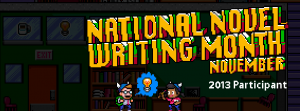Self-publishing is here to stay, and has become a viable option for writers. However, even with the stigma that used to hang over self-publishing fading, now readers have a new set of problems. The first of which is sorting through hundreds of thousands of books being self-publish every year. (Some reports say over 400,000 in 2012 alone.) Let’s face it, even with many of those books are produced by writers with an eye for quality, hiring editors and making sure to put out a product they can be proud of, the quality of many self-published books is iffy at best. I’ll be the first person to suggest to someone, just because you CAN self-publish a book, doesn’t mean you SHOULD self-publish a book.
One of the most frequent questions I get while at conventions, whether on panels or just hanging out at the parties, is, “How can I tell if a self-published book is going to be worth the money.” It’s a valid question, one that I’ve worked at finding a definitive answer to. Well, I’m just one guy, and while trying to puzzle out something like a “sound bite” that I can rattle off when people ask me that, I thought I’d ask some of my writer and fannish pals what they think.
So, mission firmly in mind, I sent out the following question: “Can you give one piece of advice on how the discerning reader can pick out good quality self-published works from the quantity?” I think the responses are pretty interesting. (And see how many of them couldn’t keep it to one piece of advice.)
Christopher J. Garcia, Hugo Award winning writer/editor of The Drink Tank:
Three ways – first, look to the product. If it’s well-produced, if it’s got a solid cover image, if it LOOKS well-done, that’s a start. Few self-published works I’ve enjoyed have ever been slap-dash in production.
Second, Goodreads. If I can find works by the author on Goodreads, and if they’re not all comments on how awful they are, even if most of the reviews are middling, I use that as a sign of potential quality.
Finally, it’s all about the Author. Search, find their blog, their posts somewhere, anything. If THAT material is worth reading, it’s a very high likelihood that the rest of their stuff shall be readable too.
Steve Drew, moderator and community manager at /r/fantasy on Reddit:
My own personal reading habits are built from my own experience reading authors I enjoy, author recommendations, and recommendations from the r/Fantasy community. In the past, it was a bit pot-luck – buying a book based on the cover kind of crap. With the advent of the internet, I can find good books through recommendations from people I trust. (Typically blurbs from authors I enjoy and/or reviews.)
I read VERY few independent books – sticking more frequently to those that are published and tried-and-true. That’s based on me being a slower reader compared to most in this genre. I don’t have time for wading through books on my own.
I have heard from authors that their presence on r/Fantasy has led to sales. Some direct sales c/o their AMA or Writer of The Day presence. More from their long-term presence on the site. That certainly helps to differentiate.
Rachel Thompson, bestselling author of A Walk in the Snark, Mancode Exposed, and Broken Pieces:
Amazon, B&N, iBooks etc., all offer free samples of books. Read the sample or download it to your smartphone, laptop, or tablet (remember, all online bookstores have free reading apps; so for example, no Kindle is required to read Kindle eBooks, just the free app). As readers, we should be able to form an opinion on the quality of the book based on that sample.
Many authors will also give editing credit (just under the title), so that gives a reader information that the book has indeed been professionally edited.
Michael J Sullivan, bestselling author of the Riyria Revelations:
My Riyria Revelations were self-published before being picked up by the fantasy imprint of a big-five publisher (Orbit: fantasy imprint of Hachette Book Group), so I read quite a few self-published titles as I like to keep up on who is doing well and recommend books I like. It’s my way of giving back. I have a large waiting list (tbr pile) and the ones I have read are, with very few exceptions, well suited to my tastes. My preferred reading material is epic fantasy so I’m going to use links for that genre – but Amazon has all kinds of list for all kinds of reading preferences.
- I check the Amazon’s Kindle Epic Bestseller’s List and skip past the “big names” like Rothfuss, Sanderson, Martin. (A lower price is also a pretty good indication, although not always) that a book is self-published. From there I can also click on the Epic Top Rated List. Titles that are on both are usually a good bet because they have been highly rated and sell well.
- I use the “Look inside the book” or download a sample copy and if the writing intrigues me, I hit “buy.”
And that’s pretty much all there is to it. I’m actually surprised when people say they have problems finding any “good” self-published books as I never have had any difficulty doing it the way I do.
Ian C. Esselmont: writes in the Malazan World with his long-time friend Steven Erikson:
I guess that what I would say is that it all comes down to that first page and first paragraph/opening. If authority is seen, or ‘felt’ in that first section, then to my mind, that’s where you catch, or lose, your scanning, hurried, reader.
Amber Scott, bestselling author of the Moon Magick Series:
In a bookstore, we browse, pick up a title, page through it and decide based on the impression we get. With ebooks, I see samples as a great way to do the same. Shop, sample, buy. Reviews can be bought and there’s a whole slew of authors with numbers in the thousands who did just that–purchased reviews. Ads are just that, advertisements paying for our attention. What it comes down to is taste. If my books are your taste, you’ll know by page one.
Hugh Howey: author Silo Saga, being Wool, Shift, and Dust, as well as the Molly Fyde books and I, Zombie:
I think the challenge for readers is similar to what is has always been: finding a book they’ll enjoy among the legions of books they won’t enjoy. Grabbing a random book out of a bookstore rarely works either. Most shoppers stick to an author they know or a book a friend recommended. When they do browse, they usually head to their favorite genre, check the cover art for the mood of the story, read the blurb, and then sample the first page.
Online shoppers should do the same. Filter for the genre you want, look for a professional cover, see if the blurb is well-written, and then read the free sample. One of the advantages here is that the indie author probably wrote the blurb, so if that is clunky or has mistakes, you can often move on to the next book. With the free online samples, there is so much to browse. It’s one of the reasons I think there’s never been a better time to be a reader.
Howard Taylor: writer and artist of the web comic Schlock Mercenary, also contributer to the Hugo Award winning audio podcast, Writing Excuses.
Easy!
A good writer who pays close attention to the craft, and who has a solid feedback loop of alpha readers, beta readers, and copy editors, is going to get more than just the writing right. Why? Because they pay attention! In that vein, I totally judge books by their covers.
First: does the cover suit the genre? How does it stack up against mass-market books in this same space? A cover that fits the genre is a good sign that the author knows the space they’re working in.
Second: How is the back-cover copy (or the “description” on Amazon)? Does it grab you? Descriptions like these are some of the most difficult things to write, and they must be edited, polished, refined, then ground to powder rebuilt molecule by molecule. Strong back-cover copy is a good sign that the author is really committed to getting this whole thing right.
Third (this isn’t the cover, but it’s close): Has it been blurbed or reviewed by anybody you know? Ultimately your best guide to a good book is reading it and deciding for yourself whether it’s a good book. Since life’s too short for that, what are other people saying about the book? I’ll take a friend’s recommendation over a random five-star review any day. And to that end, if you read a book and love it, don’t be afraid to say so.
Damon Stone, producer and game designer for Fantasy Flight Games, including the Game of Thrones trading card game, Call of Chthulu card game, and Netrunner:
When I’m looking into buying self-published works I look for a number of different things but there are three main things I consider…
1) Has it been recommended to me by someone I know and trust? Personal endorsement is still the strongest factor in what I read and when I read it.
2) Are any pages made available, or chapter excerpt from the book. Nothing tells you as much about how an author writes, than the authors writing. 😉
3) Does the site I’m making my purchases from show what other books were purchased, viewed, or reviewed by people who have purchased or reviewed the work I’m considering? If someone is a fan of GRRM and Steven Erikson , or Steven Brust and Glen Cook, or Patrick Rothfuss and Neil Gaiman and viewed this work favorably, I have an idea of what I may find.
Lisa Rodgers, agent with the JABberwocky Literary Agency:
That’s actually a very interesting question that, in my opinion, doesn’t really have a “one true answer.” There are a number of variables that a “discerning reader” probably already knows to look at in order to “appraise” the quality of a book (whether it’s self or traditionally published), including cover art, book description, and reviews. Given all of that, I think personal recommendations from people whose reading tastes you trust would be my piece of advice. I think it’s especially important for self-published work, since there is so much out there and their discoverability isn’t limited to physical shelf space.
Michael R. Underwood, author of Geekomancy and the forthcoming Celebromancy and North American Sales & Marketing Manager for Angry Robot Books:
For me, the way to find excellent self-published books is to take recommendations from indie writers. I think indie SF/F writers are going to know best what the good indie SF/F books are, because they’re going to show up together in discussions, recommendation engines, and likely in social situations – indie authors are great about trading both business and craft tips, so they’re going to know who the exemplars in their community are at any given point.
Bill Waters, writer for examiner.com about all things geek/pop culture related:
Over the last several years the publishing world (in games as well as books) has been completely turned on its head. Now it’s no longer a question about if an individual can be published, there’s any number of self-publishing routes available to individuals. However, it should be noted that even in the days of classic publishing, there was no lack of utterly terrible content out there. Now the challenge is that of discovery, among the white noise of all of the Appstore on mobile devices, in the Amazon Kindle store, and all of the other outlets available, each new publication is a speck among the masses. People go towards things that they know – those can be bestseller lists, reviews from professional critics (as well as from casual bloggers). Individual readers will now find information portals (podcasts, blogs, news feeds, etc) that resonates with that particular person’s tastes and they’ll use that as their primary channel for recommendations. That way their level of effort is reduced from a constant thrash of published titles to identifying a few reliable sources that they can use as the filter to the noise.
Brandon Sanderson, bestselling author of Mistborn, Way of Kings and the Hugo Award winning novella Soul of the Empire:
This is a tough question because the question of how do you pick out a non-self-published book, I mean it’s gotta be the same criteria, right? I don’t think the reader should worry so much about the source of the book as the content of the book. And how do you find out about books you’re going to enjoy? By function of what we do, you have to trust something. Either it’s going to be the blurb or the packaging, or hopefully you’ve had a friend read the book and recommend it to you.
I think that this is kind of a much smaller issue than a lot of people seem to be making it. Readers have always had way more to read than they have time to read, and finding the good stuff has always been kind of the quest of the reader, and I think most of us are pretty good at it and know what works for us. So I don’t know that it should matter between self-published and non-self-published. Use the same instincts.
Well, it seems like the more things change, the more things stay the same. If you’re looking for something new to read, don’t look so much at whether the book is published by an author or by a big publishing house; you’re going to get varying experiences with both. No matter where the book is coming from, just use the same process you’ve always used, no matter what that process is, to determine whether you try a new book or writer. If that process has worked to find good books in the past, it’s probably going keep working to find you good books in the future.
Happy reading!






